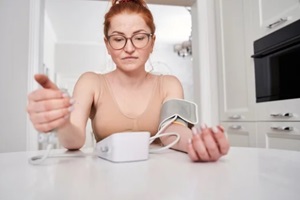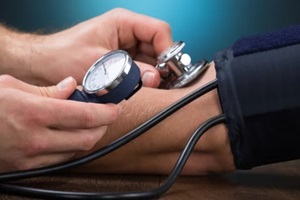 High blood pressure (also called hypertension) that isn’t treated can cause chronic kidney disease (CKD) by damaging the blood vessels in the kidneys. CKD can also cause a type of high blood pressure called renal hypertension, creating a vicious cycle. Comprehending this link gives you a good starting point to take control of your health.
High blood pressure (also called hypertension) that isn’t treated can cause chronic kidney disease (CKD) by damaging the blood vessels in the kidneys. CKD can also cause a type of high blood pressure called renal hypertension, creating a vicious cycle. Comprehending this link gives you a good starting point to take control of your health.
A Quick Look at Hypertension
Blood pressure measures the force exerted on artery walls as blood circulates through the body. This force naturally rises and drops throughout the day. Hypertension refers to consistently high readings above 130/80 mm Hg.
The top number (systolic pressure) represents pressure during heartbeats. The bottom diastolic number measures pressure between beats when the heart relaxes.
Hypertension usually develops over years, often showing no obvious symptoms. Headaches, vision changes, nosebleeds, irregular heartbeat, blood in the urine, fatigue, chest pain, or confusion may eventually occur with dangerously high blood pressure.
Over time, uncontrolled hypertension strains the heart and damages blood vessels, increasing risks for heart attack, stroke, aneurysms, cognitive decline, kidney failure, and blindness.
How Hypertension Harms Kidneys
The kidneys filter waste from the blood into urine and regulate fluid balance. Their network of tiny filters and blood vessels work 24/7 to perform this demanding job.
High blood pressure thickens and stiffens kidney arteries and tiny capillaries, impairing proper blood flow. As vessels narrow, the kidneys start to fail, allowing waste and fluids to accumulate.
At the same time, damaged kidneys lose their ability to regulate body fluids and salt balance, causing blood volume and pressure to rise further. Removing damaged parts prompts the remaining kidney tissue to work too hard, accelerating deterioration.
Who Gets Kidney Disease from High Blood Pressure?
Anyone with prolonged uncontrolled hypertension may develop related kidney impairment over time. However, certain groups may face higher risks, including:
- African Americans
- Hispanics
- Native Americans
- Alaska Natives
- People with family histories of kidney disease
- People with diabetes
- The elderly
Since hypertension and early kidney disease rarely cause symptoms, many people remain undiagnosed. That’s why screening tests and managing identified risks early on makes such a big difference.
What Is Renal Hypertension?
 Renal hypertension refers to elevated blood pressure specifically triggered by kidney damage. Diseased kidneys mishandle fluid balance, sending hormone signals that elevate blood pressure.
Renal hypertension refers to elevated blood pressure specifically triggered by kidney damage. Diseased kidneys mishandle fluid balance, sending hormone signals that elevate blood pressure.
Several conditions can lead to renal hypertension, though the most common cause is plaque accumulation that narrows the renal arteries. As blood flow decreases, the kidneys react as if dehydrated, retaining salt and water and prompting pressure to rise.
How Does Kidney Disease Lead to High Blood Pressure?
Healthy kidneys produce a hormone called renin that interacts with other hormones to flexibly constrict and relax blood vessels as needed to maintain optimal pressure. Diseased kidneys lose this fine-tuned control.
Furthermore, damaged kidneys allow fluid and waste buildup that an already overworked heart must circulate, which elevates readings. As vessels continue deteriorating from this added force, a harmful cycle propagates.
Diagnosing High Blood Pressure and Kidney Disease
Since most cases initially present no symptoms, your doctor diagnoses hypertension through regular blood pressure checks and monitors kidney function via tests such as:
- Urine albumin levels: Albumin protein in urine signals kidney damage.
- Glomerular filtration rate (GFR): GFR measures how efficient your kidneys are at filtering blood, with a low level over approximately three months indicating reduced kidney function.
- Creatinine levels: Creatinine waste byproduct in the blood points to impaired filtration.
- Imaging tests: Your doctor may order ultrasounds or CT scans to examine kidney structure and characteristics.
Monitoring these metrics is essential for early treatment to prevent further deterioration leading to kidney failure.
Protecting Your Kidneys From High Blood Pressure
The most effective ways to preserve kidney health involve controlling blood pressure through a variety of approaches, including:
 Medications: ACE (angiotensin-converting enzyme) inhibitors or ARBs (angiotensin II receptor blockers) help relax blood vessels, while diuretics remove fluid. Other drugs are available that may further reduce blood pressure.
Medications: ACE (angiotensin-converting enzyme) inhibitors or ARBs (angiotensin II receptor blockers) help relax blood vessels, while diuretics remove fluid. Other drugs are available that may further reduce blood pressure.- Diet and nutrition: Eating fewer processed foods and less sodium while focusing on fruits, vegetables, lean proteins, fiber-rich whole grains, beans, nuts, seeds, and healthy fats helps manage hypertension and its associated risks.
- Exercise: At least 150 minutes weekly of moderate aerobic activity strengthens the heart and helps arteries stay flexible and healthy.
- Weight management: Losing even 10 pounds can significantly lower readings if overweight.
- Stress relief: Chronic anxiety releases hormones that provoke vessel constriction. Relaxation therapies such as meditation help counteract this.
- Smoking cessation: Smoking damages blood vessels and strains the heart. Quitting reduces cardiovascular risks dramatically.
While treating renal hypertension aims to control pressure levels through similar measures, medications or procedures to improve kidney artery blood flow could provide added benefits.
Take Control of Your Wellness by Prioritizing Prevention with Imperial Center Family Medicine
Whether hypertension causes kidney disease or vice versa, proactively keeping your blood pressure at a healthy level clearly benefits long-term health. Imperial Center Family Medicine’s team in Durham, NC has empowered countless people to achieve holistic wellness through comprehensive lifestyle changes, targeted nutrition, and advanced medical therapies as needed.
Contact us today at 919-873-4437 or online, and let us help you improve your hypertension and protect your kidneys.
